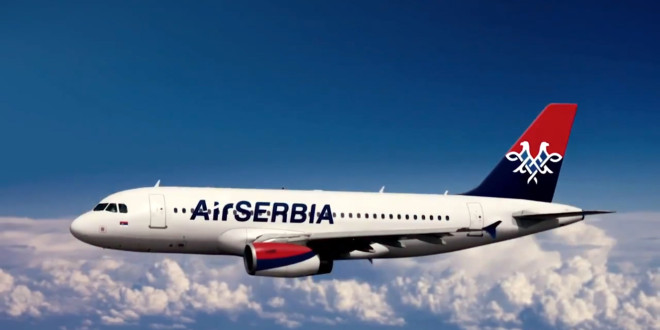Net profit grows to €15.7 million in 2017
• Sales revenue increases for 4%, total operating income reached €288 million
• 2.62 million passengers carried to and from Belgrade
• Total Available Seat Kilometres of 4.24 billion, up by 4 per cent over 2016
• Load factor grows to 73 per cents
• 749 charter flights – the best Aviolet’s result so far
• Cargo uplift increases to 6,156 tonnes (+25.3%)
• Sabre platform introduced for check-in, sales and boarding
Air Serbia, the national airline of the Republic of Serbia, today reported a net profit of €15.7 million for 2017, which represents increase of €14.8 million compared to 2016. In its fourth year of operation, the airline’s total operating income has reached €288 million. Based on detailed business analysis and thanks to the new approach and measures, operating expenses have been decreased by 7%, while at the same time, sales revenue was increased by 4%.

The total number of passengers carried in 2017 remained in line with the previous year. Despite the airline consolidating its network and facing a sharp increase in competition, Air Serbia has welcomed more than 2.62 million guests. Serbian national airline’s passenger carrying capacity, measured in Available Seat Kilometres (ASKs), increased by 4 per cent to 4.24 billion by the end of 2017.
Despite the enhanced capacity, due to the introduction of new Recaro seats into Airbus fleet cabin, the average seat load factor, a measure of capacity utilization, further rose by 1 percentage point from 72.4 per cent in 2016, to 73.4 per cent in 2017.
Last year has seen a record 749 Aviolet’s charter flights, with 174,000 passengers who travelled to popular destinations in Greece, Turkey, Spain, Italy and Tunisia.
On the cargo front, Air Serbia continued to post double-digit annual growth by shipping 6,158 tonnes of freight and mail in 2017, equating to a 25.3% increase in total uplift over 2016.
One of the most significant developments was the migration of Air Serbia’s technology infrastructure to Sabre. Laying the foundations for future sustainable growth, a modern platform for managing core airline operations such as sales, check-in and boarding has been introduced. The move to Sabre has enabled Air Serbia to introduce ancillary services and a new flexible fare structure that went live in February 2018, providing guests with more travel options and the ability to personalise their travel with Air Serbia.
Duncan Naysmith, Chief Executive Officer of Air Serbia, said: “2017 was a pivotal year for Air Serbia that saw the airline implement fundamental changes to strengthen the business, which have already positively impacted on many key operating metrics.
This is a fantastic sign of things to come. Air Serbia managed to maintain its strong passenger numbers from the year before. Both financial and operational performance in 2017 have set a strong base for us going forward.
Despite intensified competition and other unfavorable circumstances in the market, ever since 2013 we continue to improve our results. We started 2018 with the same goal – to push forward on all the fronts, which will hopefully lead us to even better years ahead.”
In addition to these achievements, the Serbian flag carrier celebrated two major operational milestones in 2017, including the 90th anniversary of the establishment of Aeroput, its predecessor, and welcoming its 10 millionth guest since being rebranded into Air Serbia in 2013.